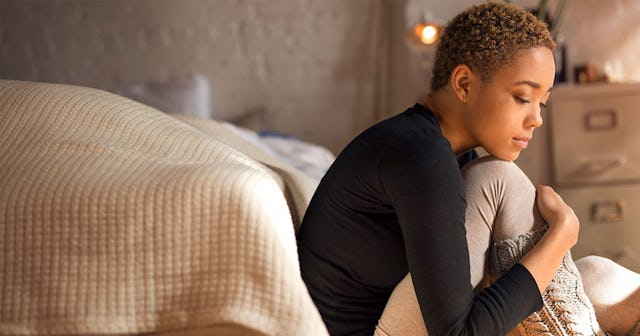The Side Effect Of Being A Cancer Widow I Don’t Admit

I write often about grief. I speak relatively openly about the struggles and heartaches I run into as a young widow and solo parent to two grieving children. I’ve detailed my husband’s illness to thousands. And yet, there is one part of my widowhood that I have never admitted to anyone other than my sister-in-law: illness anxiety.
The other day I went for a long run. My first since quarantine started. I pushed myself beyond where I should have pushed myself but I loved being outside and moving—going. A few days later, I woke up to find a bruised toenail.
The logical part of my brain thought this: you ran too far without training in inappropriate sneakers, and now you have a bruised toenail. They are common for runners, and if you Google “bruised toenail,” the first articles you find will be about runners.
The cancer widow part of my brain began Googling a rare skin cancer that begins as a dark line often under finger or toenails as a pit of anxiety landed like a wrecking ball in my stomach.
The logical part of my brain responded to the cancer widow part with more logic: well, then let’s go to a podiatrist and get the toenail checked out. If it’s actually skin cancer, or any cancer, the earlier it’s diagnosed, the better.
The cancer widow part of me was too paralyzed with fear to even Google a podiatrist. Because what if. What if the doctor does a few tests and comes into the room and says the words I’d heard once before when my husband entered a doctor’s office with a headache? What if the nightmare starts again?
The logical part of me could not talk sense into the cancer widow part of me. My decision was to worry into a vacuum. To paint the toenail a bright pink to hide the bruise and simply worry. Not a smart plan, and yet the one I went with.
In the time before—before I ever heard the word brain cancer and watched my forty-year-old husband die from it—I wasn’t one to diagnose myself with anything. The opposite, in fact. A bruise was a bruise because I must have bumped myself somewhere. A headache was a headache because I hadn’t drank enough water. A cold was a cold because people get colds.
But now, after my husband presented with a headache that turned out to be an aggressive and vicious type of terminal brain cancer, that sense of security is gone. A bruise might be blood cancer. A headache may be brain cancer. A cold could be a sign of a failing immune system because a cancer is attacking some invisible part of the body.
Even routine cancer screenings leave me in a state of high emotional distress. I have a visceral, heart-pounding, sweat-soaked, inability-to-breathe reaction to any routine cancer screening. I brace myself for the results of blood tests or doctor’s examinations. Each time I am sure this will be the time I hear the words: we found something suspicious and it’s cancer.
I have a few theories as to why this illness anxiety has gripped me during widowhood. One, it’s too easy to close my eyes and summon up memories of waiting rooms and hospitals—how they sounded and smelled, how they looked and felt. That’s my trauma rearing its head. Cancer is scary. Cancer doesn’t discriminate and chooses victims regardless of how much light and love they bring to the world, and that’s scary.
Two, as a solo parent, I’m highly vigilant about my health and safety because I am the only parent my children have left. It’s a responsibility too important to take lightly in any way.
And three, and likely the driving factor behind my newfound illness anxiety, is this truth: my husband was the better of us, smarter and funnier and with a confident way about him that just made him lovable to all. And if cancer could happen to him, of course it could happen to me. If his headache could turn out to be something life-threatening, mine could, too. That’s just logic, isn’t it?
The truth is, worrying into a vacuum about something won’t resolve anything. There’s a line between vigilance and paranoia that I haven’t yet learned to walk during my widowhood journey. But I may never learn how to walk that line. I’ll probably always be a little hyper-vigilant because I can too easily picture the doctor walking into the exam room with the chart filled with bad news.
I can’t cure my illness anxiety. I definitely can’t give any advice to cure anyone else’s. The best I can do is tell my story. Because what I have learned during my widowhood journey is that I shouldn’t be afraid to tell my story, give my truth. Being honest about the things I’m struggling with in widowhood may end up helping another young widow feel a little less alone in their journey.
It’s the very least I can do.
This article was originally published on